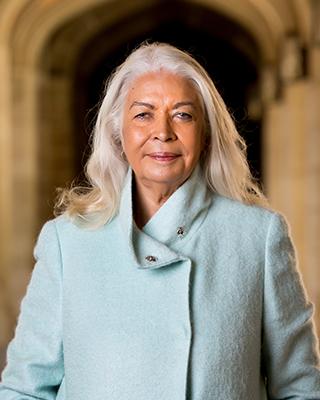“It has long been my belief that the right to a good life is founded in a quality education.” So stated Professor Marcia Langton AM, in her delivery of the keynote address at the 2018 Annual General Meeting of the Melbourne Grammar School Foundation.
Professor Langton spoke compellingly about how a quality education builds the foundation for all individuals to partake in the life many people take for granted – ongoing employment, a stable family, a home of your own and, perhaps, overseas travel. “Evidence shows this consistently; it shows it is the case now and has been for a very long time,” she said.
However, for Indigenous children, there can be significant educational disadvantages which can operate as a barrier to this type of life. Professor Langton highlighted how schools like Melbourne Grammar School, working with Indigenous families from across Australia, is crucial to addressing this issue.
“The reciprocity of relationships is a fundamental Aboriginal and Torres and Straight Islander value,” explained Professor Langton. “In addition to providing a benefit to Indigenous children, educational institutions also gain from having these profound relationships with Indigenous families and their communities.”
“I have seen how contributing to closing the educational gap in a meaningful and practical way builds a meaningful ethic in our schools and in our universities, which is valued by students and staff,” said Professor Langton. “Plus, these relationships lead to a better understanding of our cultures and histories.”
“We want our children to grow up with a strong powerful vision of what our future might be. This is another reason why education is so important,” said Professor Langton. “For Aboriginal and Torres Strait Islander children, it helps them understand the very complex issues such as how do we, as a people, fit in to the nation; what does the constitution say about us; and why shouldn’t Australians take the 65,000 years of our presence seriously?”
“Sometimes people ask me why you would separate Indigenous children from their families and send them to board at a school like Melbourne Grammar,” she said.
“What they don’t understand is that communities and individual families themselves are approaching high performing schools, precisely because they want their children to receive a good education.”
“Outsiders who are not familiar with this flow of children from Aboriginal families to these schools need to understand that this is not creating a generation of stolen children. This is about people actively seeking to improve their children’s futures. They want, for their children, what other Australian children have. They want to lift their children out of the environment that holds them back, that prevents them from performing well at school and completing a quality education,” explained Professor Langton.
“When schools like Melbourne Grammar School offer places to Indigenous children, they are offering them the best chance to obtain the necessary skills to participate fully in Australian life, because they are offering them the opportunity to overcome those conditions which are preventing them from succeeding,” she said.
Professor Marcia Langton AM is an Associate Provost, the Redmond Barry Distinguished Professor, and Foundation Chair of Australian Indigenous Studies at the University of Melbourne. One of Australia’s most respected academics, she has produced significant work in the areas of political and legal anthropology, Indigenous engagement with the minerals industry, and Indigenous culture and art, and is recognised for her advocacy for Indigenous rights.

